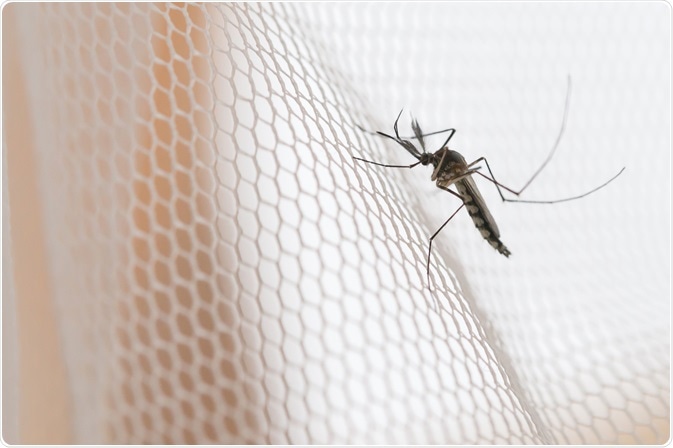Malaria is a preventable and curable disease. Awareness and precautions, especially before traveling to an area endemic for malaria, are important for the prevention of malaria. Travelers are most susceptible to bringing back infections. For example in 2010, over 1,700 travelers were diagnosed with malaria after returning to the UK. Most of these cases were acquired in Africa.
 Image Credit: GrooveZ/Shutterstock.com
Image Credit: GrooveZ/Shutterstock.com
Four-step approach to prevention
There is a four-step approach to the prevention of malaria:
1. Awareness of the risk of malaria and the risk of complications associated with it is the first step in prevention. Travelers to areas with a high incidence of malaria need to be aware of their risk and take adequate precautions.
2. Prevention of mosquito bites. A single bite is enough to transmit malaria infection. Adequate protection against mosquito bites is important. Simple measures like wearing covered clothes, using a mosquito net, and using an insect repellent help in preventing bites. Complete avoidance of bites is not possible however the number of bites may be reduced as much as possible.
All travelers and residents of high malaria risk areas are advised to stay indoors especially after dusk and keep doors and windows screened or closed to mosquitoes. A mosquito net especially ones treated with insecticide help prevent bites during sleep.
An insect repellent should be used on the skin and around the sleeping area. Those applied over the skin need to be re-applied frequently. The most effective repellents contain diethyltoluamide (DEET) and are available in sprays, roll-ons, sticks, and creams.
Covered clothes also help prevent bites. Light-colored, loose-fitting, trousers, rather than shorts, and shirts with long sleeves are preferable particularly during the early evening and at night when mosquitoes prefer to feed.
3. Antimalaria tablets for prevention of infection. A complete course of prescribed medication before, during, and after travel is important in the prevention of acquiring infections. This is called chemoprophylaxis and is useful for travelers.
Antimalarials are not 100% effective so taking steps to avoid bites is also important. Commonly prescribed drugs include Chloroquine, doxycycline, mefloquine, primaquine, and atovaquone plus proguanil (Malarone), etc. Chloroquine needs to be taken for four weeks after return from travel. Malarone may be taken for one week after return.
4. Immediate diagnosis after the onset of symptoms helps prevent complications of malaria. Symptoms could appear after a year of traveling and this needs to be considered while diagnosing and treating malaria.
How to Prevent Malaria
References
Further Reading
Last Updated: Nov 18, 2022